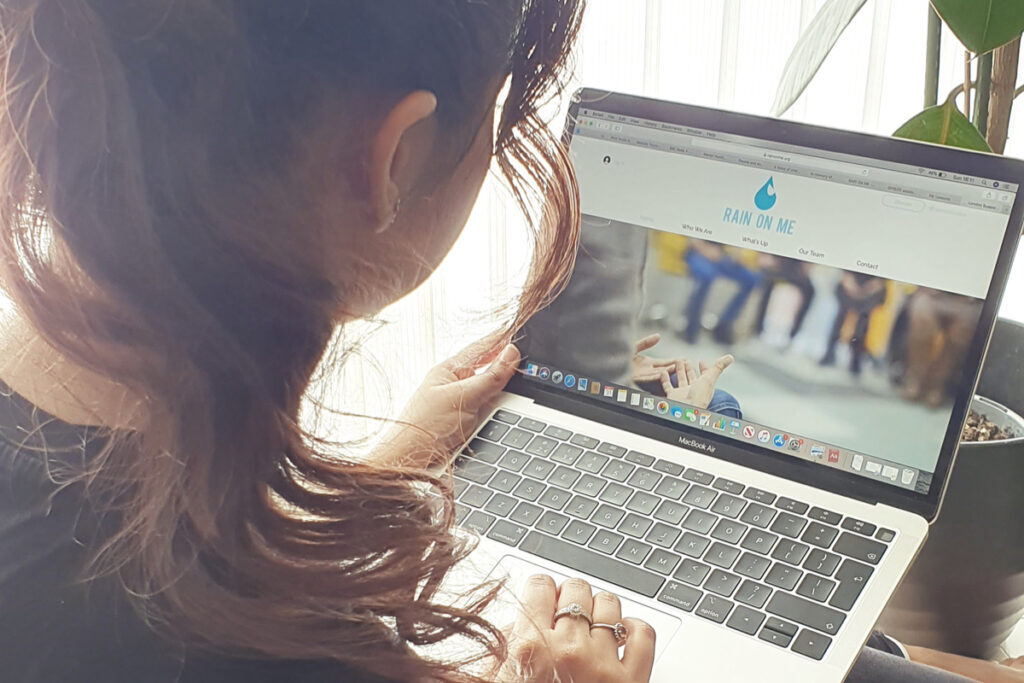
Words by Abi Scaife
“We never shut our doors to anybody who needs that space.”
Deepanshi Gulati has struggled with her mental health since before the pandemic - and, like others, she had a difficult experience with mental health professionals that left her feeling alone.
Not knowing where to go to meet others in a similar position - Deepanshi struck out on her own and in 2018, at the age of 22, she set up Rain On Me CIC.
“I didn't have the best experience with my psychiatrist,” explains Deepanshi. “I just wanted to meet people who were going through similar struggles. Someone who would just tell me that I'm okay - I'm not broken, in some way. So, I set up a few empty chairs in a room in East London, and I hoped people would turn up and talk to me - hear me.”
Unfortunately, it wasn’t long before the Covid-19 lockdowns hit - at which point, Rain On Me began online meetings, too.

“In the beginning, people were as lost as I was in the space because even I didn’t know how it works. It was mostly just to sit down and share whatever's on their mind,” Deepanshi tells Smiley News. “Once people got past that initial stage of nervousness and uncertainty, they became much more relaxed and open to share and we all reached some form of a mini-epiphany … where it was like, ‘okay, I can breathe now, and I've let out what I was I was holding in’.
“That moment really changed a lot of things because that's when I knew that I was going to continue this. I realised I'm not the only one. People were so accepting towards me in those moments, and that helped me accept myself.”
The power of human kindness
In essence, Rain On Me is a CIC that brings together normal people, without training and allows them to bond through their own experiences. It calls on the power of human kindness, bringing together everyone in the room with the knowledge that they are all struggling, and all need a shoulder to cry on.
“It's a very confidential, non-judgmental space where you can come and talk about whatever you want - or not talk at all. There is no pressure or obligation to be there every time,” says Deepanshi. “But that presence is enough for people around them … just to hear other people's experiences, that they're going through similar things and even if you don't say a word, it's still having an impact on you.
“Even after the sessions they started to connect as friends and have a drop-in just checking in [on the] phone and just to see how we're all doing.”

The aim is to help people feel accepted, and that their voices are being heard - something that is especially important for people from marginalised communities.
“Most of the group members are from marginalised communities; they’re people of colour or they're neurodivergent or they might be having financial issues and they're struggling because of the cost of living crisis,” says Deepanshi. “It's a very unprecedented time, especially after the pandemic. But most of our members have experienced some form of neglect or dismissal from … mental health services. They just want a place where they can belong.”
Through Rain On Me, people who are struggling now have access to informal help, from people who really understand what they are going through. Those that need something face-to-face and are based in London can attend in-person support groups, while others can attend online groups, all of which run around monthly.

“Some of the topics that we've discussed in the past include forgiveness and confidence money, family, conflict, conflict resolution, anger, and gratitude,” surmises Deepanshi. “It really varies and depends on what the members are asking for. It's a very collaborative space, so if people are saying, they really want to look into this topic, we curate a session specifically on that so that we can meet our members' needs as well.”
Since its inception, Rain On Me has also begun a befriending service, for those who need something more personal than a group session. It involves a single person calling you to listen and talk, without the pressure or problem-solving of seeing a therapist.
“Since the pandemic, we have grown quite dramatically because we opened our doors internationally,” says Deepanshi.
“We get people from all over the world from different countries and backgrounds and cultures. But it's so beautiful, how we all have very similar stories to share similar struggles to share.”
Support Deepanshi's mission through Rain On Me by donating.
This article aligns with the UN SDG Good Health and Wellbeing.